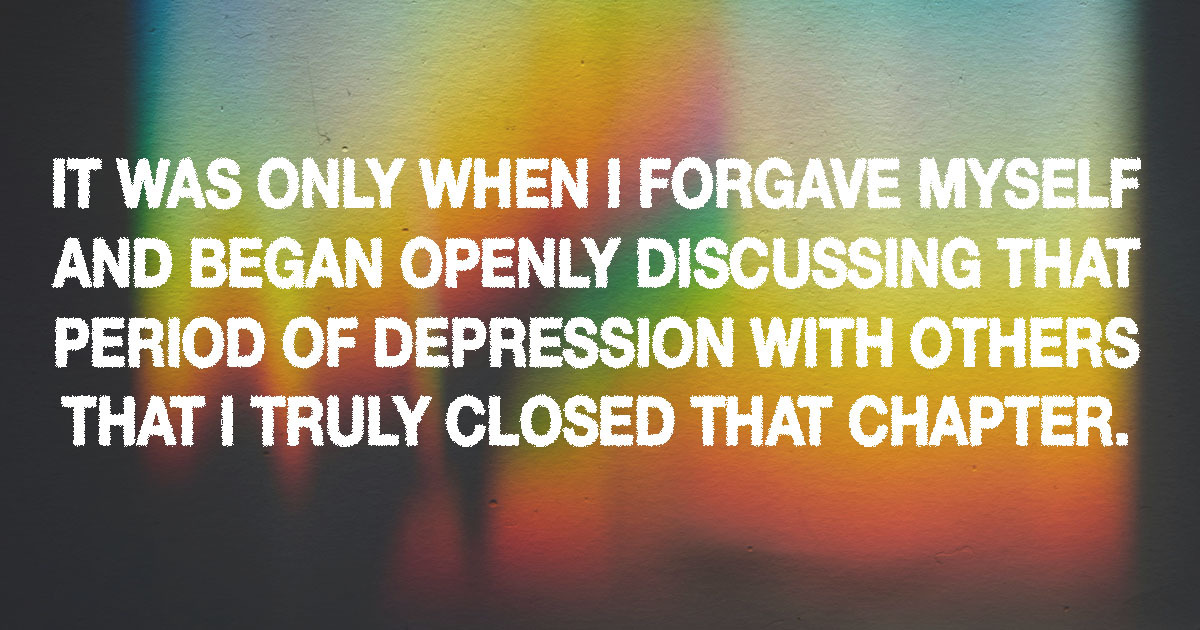“Depression” is regarded as sort of an umbrella term for negative feelings than some rigid medical terminology. Treating it as a synonym to “sadness,” people often use the two interchangeably, which blurs the lines between definitions even more.
What I learned from my own battle though is that true depression is more of an infection of the mind, that grows, spreads, and then feeds on itself until it eats you away. It pulls you in like a vortex, and it’s often impossible to fight it. Sometimes, you only become aware of its spell when it releases you from its clutches. In other words, the intensity and scope of the illness that poisons our minds are only grasped from a distance, in retrospect. Emotions and their intensity constantly vary when you’re young, yet I wouldn’t call typical teenage agony a true form of depression.
Depression is a different kind of creature—imposing its will on you, oppressing your very being until you submit to its desire.
It’s hard to pinpoint its beginning—one day, you just notice that you’ve been carrying an invisible weight inside your soul, and it keeps pushing you into a void. This concept of “feeling down” isn’t similar to strong emotions like heartache, but a dull, flat sensation. Instead of pitch back, it’s gray… gray like smoke slowly filling the air, in a dim world of shadows after nightfall.
As we navigate through our everyday lives in a state of semi-consciousness, the days blend into one, and we feel perpetual exhaustion without any apparent exertion. Our spirits become drained, yet we cannot muster the resolve to take a step back, nor do we move forward. What’s worse, this condition develops gradually, so we fail to notice its grip on us, accepting it as a natural consequence rather than a product of a silent virus.
Our thoughts become increasingly distorted, ideas warped, and soon our usual stream of consciousness turns into: “Oh no, another day has begun. Let’s somehow survive the hours until bedtime.” Unbeknownst to us, this is not who we are; it is depression, acting as an intruder, taking control of our behaviors and thoughts, dictating perpetual discontent and a lack of desire for change. In fact, consumed by our dark world, the notion of change doesn’t even cross our minds, or more importantly, that we ourselves can take steps to regain control of our lives… until something unexpectedly jolts us out of this state. Then we’re astonished looking back, and once fully “healed,” we can’t recognize the person we were in the recent past. Returning to our real selves, it feels like we were hypnotized in retrospect, and we’re wondering, “Who was that person?”

In our sober state, we can’t comprehend ourselves back when we were depressed, which widens the gap between the “normal” and “depressive” periods.
My perception of the world, myself, and others became absurd and completely distorted by the demands of my mood. Yet, I called that world my reality at the time, firmly believing I was interpreting things correctly.
Nothing held any significance in my life anymore—no dreams, goals, ambitions, doubts—nothing. I was merely an empty shell, incapable of anything except constant pondering about how everything was futile and a waste of energy.
To this day, I don’t know exactly what “clicked” within me, and how I suddenly came to my senses. It was as if I had awakened from a long, lucid dream—everything made sense, clear before my eyes. I found myself replaying the events of the previous seven months and couldn’t believe that was really me. I don’t know how or why it all happened exactly then, but it did; my depressive episode suddenly came to an end. The recovery was far from complete: I had to confront my actions and decisions, accepting that they were now part of my past. I had to correct my mistakes and rediscover my true self, reclaiming all the lost parts of my personality. After going through all of that, I started to dread the memories of that dark period. I couldn’t fathom how I ended up there—that life felt foreign to me, just like it might to you.
It was only when I forgave myself and began openly discussing that period of depression with others that I truly closed that chapter.
For a long time, I feared that depression might return and that I wouldn’t recognize it until it was too late. I dreaded the idea of hitting rock bottom again and facing another battle at some point in my life. However, today, I refuse to let that fear overpower me. When I sense it growing, I take away its power by openly talking about it with my loved ones, not allowing it to linger within me where it can feed and ultimately prevail. No matter how much courage and strength it requires, I do everything in my power to prevent depression from returning, as that is the most I can do. I don’t know what the future holds, but what I do know is that I’ve become stronger because of this.
Depression has a way of making us feel incredibly isolated. We’re here to remind you of the truth that you are not alone. We encourage you to use TWLOHA’s FIND HELP Tool to locate professional help and to read more stories like this one here. If you reside outside of the US, please browse our growing International Resources database. You can also text TWLOHA to 741741 to be connected for free, 24/7 to a trained Crisis Text Line counselor. If it’s encouragement or a listening ear that you need, email our team at [email protected].